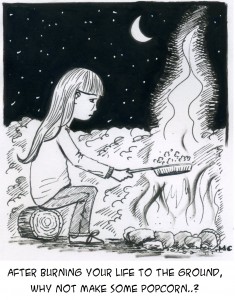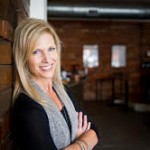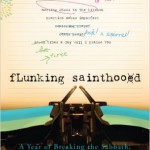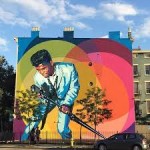Post by Contributor Susan Gray Blue
If I emerged from fundamentalism, anyone can. I know I’m not alone. Maybe not everyone was sent to a Jesus-branded charm school, but religion plays a significant role in the lives of most Americans, even in our shifting spiritual landscape. Seven years ago, roughly 78 percent of the country was Christian. Now, researchers estimate that portion is closer to 71 percent. In that same time span, the number of Americans who say they aren’t part of any religion has grown to nearly 23 percent.
Making that shift away from religion sometimes feels triumphant, like you’ve landed on another planet where the air is easier to breathe. And it sometimes feels like you might never catch your breath again. I grew up with a rigid belief system hardwired into my psyche, steeped in judgment, so my path out was twisty and treacherous and worth every step.
For me, leaving the church required a bonfire of my beliefs. But who doesn’t love a good bonfire?

Getting all the way out meant more than changing my belief system. It meant uprooting those pesky underlying patterns that often haunt people years after they’ve lingered in a pew. You know the patterns – the ones that cause an angry Methodist to become an angry atheist or a dogmatic Baptist to become a dogmatic environmentalist (or more often, that cause a Baptist to simply stay a Baptist forever-and-ever-amen).
I saw how easy it would be to stop attending church but not to really change. I wouldn’t be stuck in a pew, but I’d be stuck in the same patterns. Different clothes, same habits. Different beliefs, same attitude. Different paint, same foundation. Different scenery, same rut.
If you’re looking for broader truths and hoping to find a higher plane than the “I’m right, you’re wrong, good luck in hell” way of seeing the world, I’m here to tell you: the air feels great out here. Herein lies a fistful of earnestness, for what it’s worth. It’s all the finger pointing I’ve got left in me, but it’s pointing at a path out, not at the people along the way.
Here’s what happened:
- Instead of worrying about sin, I started wondering how I could help people on their own terms.
- Instead of being dogmatic, I became curious and understanding.
- Instead of thinking everyone else was wrong, I started appreciating them.
- Instead of working toward heaven, I occupied the present moment.
- Instead of approaching the world with an agenda, I hoped to spread peace and kindness naturally.
- Instead of having pre-fab answers, I opened myself to each experience and started responding spontaneously.
- Instead of buying into fear, I uncovered beauty in my own very particular way.
- Instead of looking to others for answers, I connected with my innate wisdom.
- Instead of passively awaiting God’s will and wishing reality away, I took responsibility for my life.
- Instead of awaiting judgment, I got busy becoming who I am.
- Instead of participating in a top-down hierarchy, I let the truths settle into my body and live there.
- Instead of dangling between heaven and hell, I wanted to embody my soul on Earth.
Of course, that took time. I didn’t travel the world sitting in ashrams or walking in the footsteps of medieval saints, but I went on a cover-to-cover pilgrimage with books and made incremental changes as part of my non-exotic, workaday life.
Connect with Reba Riley on Facebook Twitter Goodreads
More about Post-Traumatic Church Syndrome (Available in hardback, e-book and audio formats. Paperback coming 3/15/16.)












